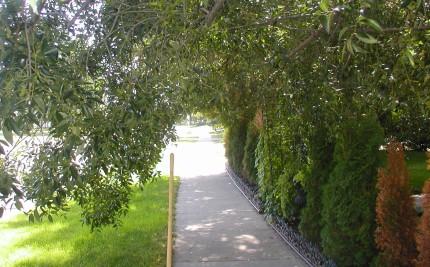
The Community Standards Bylaw requires that you maintain the trees on the perimeter of your property.
Overhanging Trees
Prune trees and shrubs located on your private property so that they do not overhang or block pedestrians or motorists using the sidewalks and roads.
The location of the property line should be confirmed prior to pruning or removing a tree, as the tree may be City-owned if a portion of the yard is within the Road Right-of-Way. Maintenance of City-owned trees must be coordinated by the City.
For those who require assistance trimming large trees, the City recommends using a certified ISA Arborist.
The City prunes boulevard and open space trees on a regular, cyclical schedule.
- Boulevard and open space trees are pruned on a five year cycle, with the exception of conifers and trees prone to specific diseases
- Trees prone to diseases such as Dothiorella elm wilt (Dothiorella ulmi) are pruned every five years, while trees with black knot (Apiosporina morbosa) and fire blight are pruned every four years
- Conifers are not pruned by the City, unless there are explicit safety concerns as identified by an Urban Forester
- Broken branches are corrected as they are reported; for additional information on service levels please refer to Urban Forestry Operations.
Reporting Your Concerns
If you have a concern about trees overhanging sidewalks or roads:
- Discuss your concern with the property owner
- Record the address of the violation and a description of the problem if you can't resolve it directly with the property owner
- Call 311
- Provide your name, address, phone number, and the details of your concern in case your testimony is required in court
Responding to Your Complaint
After you call 311, the City takes these steps to help with your issue:
- A file is created specifying your concerns
- A Municipal Enforcement Officer (MEO) or Community standards Peace Officer (CSPO) opens an investigation
- The officer investigates your complaint within 4 business days
- The officer may issue a warning notice with directions to remedy the problem within a specified time frame or issue a bylaw ticket with a fine ranging from $250 to $10,000 depending on the circumstances
- The officer may issue an order, which allows the City to fix the problem and bill the property owner for the cost
- The City may contact you to appear as a witness, if the matter goes to court

